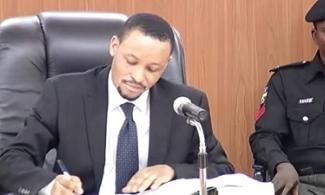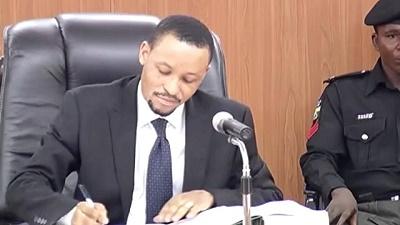
Umar said the Tribunal did not comply with the order of the High Court and the National Industrial Court, because they are courts of coordinate jurisdictions

Danladi Yakubu Umar, Chairman of the Code of Conduct Tribunal (CCT), says he acted within the inherent powers and jurisdiction of the Tribunal in ordering the suspension of Walter Onnoghen as the Chief Justice of Nigeria.
He also noted that only the Court of Appeal can determine if he had rightly applied the powers.
He said this on Monday in response to a petition filed by Grace Stephen Wogor, a lawyer.
The petition was then forwarded to him by the Federal Judicial Service Commission (FJSC).
Umar said the Tribunal did not comply with the order of the High Court and the National Industrial Court, because they are courts of coordinate jurisdictions, stressing that the chairman and members of the CCT are not “constitutionally subject to disciplinary proceedings by either the National Judicial Council (NJC) or the Federal Judicial Service Commission (FJSC)”.
The CCT chairman said: “It is left to the appellate court to determine whether or not the order was rightly or wrongly granted. The petitioner had alleged that I granted an ex parte order directing the President to suspend the Chief Justice of Nigeria, who is a defendant in a charge filed against him at the tribunal.
“It is important to state that I acted within the inherent powers and jurisdiction of the Tribunal and that whether or not the order was rightly or wrongly granted is now a matter to be determined by the Court of Appeal, since the defendant appealed against the ex parte order.
“Therefore, with the appeal against the ex parte order at the Court of Appeal, the matter is now subjudice. The petitioner alleged that I assumed jurisdiction on the matter of the CJN as defendant in a charge filed against him by the Code of Conduct Bureau (CCB).
“The defendant (Onnoghen) had appealed the ruling of the Tribunal on the jurisdiction to the Court of Appeal.
“On 30th January, 2019, the Court of Appeal delivered a ruling on the appeal filed by the defendant to the effect that the defendant should appear before the Code of Conduct Tribunal to answer the charges filed against him by the CCB.
“Consequently, the appeal by the defendant was dismissed by the appellate court, thereby affirming the ruling on the Tribunal’s jurisdiction.”
On failure to comply with some lower court orders to halt Justice Onnoghen’s trial, the CCT chair said it was because they are courts of coordinate jurisdiction with his tribunal.
He added: “The petitioner alleged that I failed to comply with orders issued by the High Court of the Federal Capital Territory and the National Industrial Court restraining the Tribunal from taking further steps in a matter before it.
“It is worthy of note that both the High Court of FCT and the National Industrial Court are courts of coordinate jurisdiction with the CCT.
“More so, the High Court of FCT and the National Industrial Court have nothing to do with any matter pertaining to non-declaration of assets. The Tribunal is the only court that has jurisdiction on the matter relating to failure to declare assets or false declaration by public servants.
“The only courts that have supervisory powers over the Tribunal are Appeal Court and the Supreme Court of Nigeria.”
The CCT chair denied breaching judicial oaths because he did not subscribe to such, noting that he could not be sanctioned either by the NJC or the FJSC.
Umar said: “The petitioner alleged that judicial oaths were breached and that the NJC should consider appropriate sanctions.
“It is to be noted that the chairman and members of the CCT are not judicial officers. This is predicated on the fact that the chairman and members of the Tribunal, during swearing into office, only subscribe to official oaths and not judicial oaths.
“Therefore, not being a judicial officer, I did not subscribe to judicial oaths and therefore could not have breached any judicial oath as alleged.
“With regards to the prayer of the petitioner for appropriate sanction against the CCT chairman, it is important to note that the chairman and members of the Tribunal, not being judicial officers, are not constitutionally subject to any disciplinary proceedings by either the NJC or the Federal Judicial Service Commission (FJSC).”